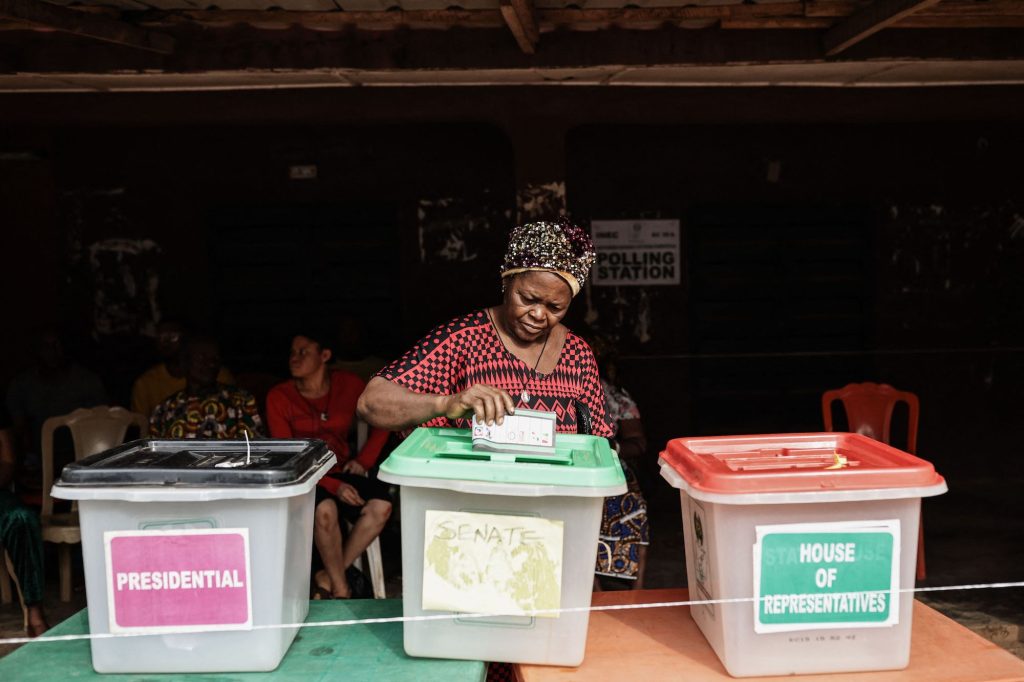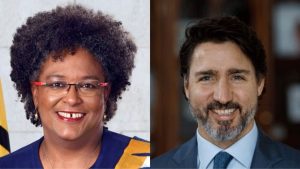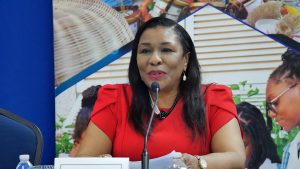
(CNN) — Widespread delays overshadowed a crucial presidential election in Nigeria Saturday, as millions voted to elect their new leader. The hotly contested poll is being held simultaneously with elections for representatives for the country’s parliament.
CNN confirmed reports from eyewitnesses of isolated violence at two polling stations in Lagos, with the military forced to intervene. CNN has reached out to INEC for comment.
In chaotic scenes at a polling unit in Maraba, an Abuja suburb, a large crowd of voters struggled to cast their ballot, a CNN team witnessed. Those who did manage to cast a ballot did so in the full glare of those standing next to them, in contravention of the Independent National Electoral Commission (INEC) guidelines which establish privacy for voters.
“People are voting in exposed spaces, and everyone can see who they are voting for. There’s no privacy. I won’t be surprised if this polling unit is canceled,” Elias Ajunwa, one registered voter, said.
Ajunwa expressed unease about the situation. “There’s the possibility of any hooligan carting away INEC materials because of how vulnerable the INEC officials and their materials are,” he added.
About 93 million Nigerians in a country of 200 million people are registered to vote, according to electoral body INEC, but only 87 million are holders of a permanent voter card (PVC), a main requirement to cast a ballot. The election will be Africa’s largest democratic exercise.
The Chief Observer of European Union Observation Mission to Nigeria, Barry Andrews, told CNN it was premature to make any conclusions about widespread delays.
“We’ve taken note of those reports and we will look across the country to see whether this a pattern or whether it has in any way hindered the exercise of people’s political rights to vote or caused frustration or caused people to turn away. For the moment, it’s premature to make any conclusions about it.”
People were still waiting to cast their ballots despite polls being expected to close at 2:30 p.m. local time (8:30 a.m. ET). Voting did not start until after the scheduled opening time in some polling stations.
One polling station in Lagos delayed opening as officials were still setting up after polls were meant to open, a CNN team witnessed. An official urged eager voters to be calm and “treat each other with love” as they continued to wait.
The same issue dogged several other voting locations, including in northern Kano State and southern Bayelsa State, with no election officials in sight at 8:30 a.m. local time, according to Reuters. In previous elections, voters in some areas have complained that polling stations opened hours late or did not materialize at all.
Ballots will be counted at polling places at the close of voting and transmitted electronically in real-time to INEC’s Result Viewing portal (IReV), a first of its kind in Nigeria, the commission tells CNN.
“With the electronic transmission system (IREV), people will already know the winners before the official announcement is made,” adds Rotimi Oyekanmi, a spokesman for INEC’s chairperson.
To win, a candidate must garner a sufficient number of ballots to meet the 25% vote spread in 24 of Nigeria’s 36 states. In the absence of this, a second round run-off between the top two candidates will be held within 21 days.
Eighteen candidates are on the ballot for Nigeria’s top, but three are leading the race for the popular vote, according to pre-election surveys.
One of the key contenders is Bola Ahmed Tinubu, the candidate of term-limited President Muhammadu Buhari’s party, the All Progressives Congress (APC). Another is the main opposition leader and former vice president Atiku Abubakar, of the People’s Democratic Party (PDP). And third strong contender, Peter Obi, is running under the lesser known Labour Party, and altered early predictions of the presidential vote, which has typically been two-horse races between the ruling and opposition parties.
Seventy-year-old Tinubu, 70, is a former governor of Nigeria’s wealthy Lagos State, who wields significant influence in the southwestern region where he is acclaimed as a political godfather and kingmaker.
He boasts of aiding the election of Buhari to the presidency and declares it is now his turn to lead the country.
Candidate of the opposition party PDP Abubakar, 76, is a former Nigerian vice president and a staunch capitalist who made his fortune investing in various sectors in the country.
Abubakar’s presidential bid (his sixth attempt) had fueled concern that it might usurp an unofficial arrangement to rotate the presidency between Nigeria’s northern and southern regions, since he is from the same northern region as the outgoing leader, Buhari.
Labor Party’s Obi is a two-time former governor of southeastern Anambra State and has been touted as a credible alternative to the two major candidates by his hordes of supporters, mostly young Nigerians who call themselves ‘Obidients.’
Obi is also the only Christian among the leading candidates. His southeastern region has yet to produce a president or vice president since Nigeria returned to civil rule in 1999.
The ruling party’s Tinubu, from the religiously mixed southwestern part of the country, is a Muslim and also chose a Muslim running mate, despite the country’s unofficial tradition of mixed-faith presidential tickets.
All top three candidates are confident they can turn Nigeria’s fortunes around if voted into power, as the country battles myriad economic and security problems that range from fuel and cash shortages to rising terror attacks, high inflation, and a plummeting local currency.
One voter, Wandu, told CNN’s Larry Madowo in Lagos on Saturday that the most important issue is security: “We need someone that has a hold and an understanding of the security challenges that we have. The economy is in free fall. We need someone that has a fair understanding of what we need to be better.”
Nigeria’s security forces have mobilized personnel to ensure hitch-free electioneering across the country.
The run-up to the polls has been fraught with violence that stemmed from protests against unpopular government policies and lethal attacks by armed criminal gangs.
On Wednesday, a senatorial candidate for the Labour Party, was shot and burned in his campaign vehicle in the country’s southeastern Enugu State, police said.
Electoral body INEC suspended the election in Enugu East Senatorial District following the death of the candidate, it tweeted on Saturday, adding that the election will now be held on March 11.
Before the killing, violent protests had erupted across Nigerian states as citizens railed against the scarcity of gasoline in petrol outlets and a shortage of cash that followed a controversial currency redesign.
INEC hasn’t been spared from the chaos; its facilities have been torched in parts of the country.
Voting was canceled at more than 200 planned polling units across Nigeria and voters redirected to other poll locations, INEC said, due to security concerns.
Ahead of the elections, national police ordered a restriction of non-essential vehicular and waterway movements from midnight on election day until 6 p.m., while the country’s immigration service has ordered the closure of Nigeria’s land borders from midnight Saturday until midnight Sunday.
Weeks before polling day, the service had confiscated over 6000 voter cards from illegal migrants, whom it said had other national documents in their possession.
INEC spokesperson Oyekanmi nevertheless insists the poll results will be free and fair.
“The experience Nigerians will have for the 2023 elections will be far better than previous elections and the integrity (of the polls) will be clear for everyone to see,”Oyekanmi told CNN days before the election.
Final results are expected to be announced a few days after polling.
Current President Buhari tweeted on Thursday: “There should be no riots or acts of violence after the announcement of the election results. All grievances, personal or institutional, should be channeled to the relevant Courts.”





More Stories
Barbados and Canada hold talks on developments in Haiti
Nude cruise to set sail from Miami in 2025
Q 100.7 FM celebrates its 20th anniversary